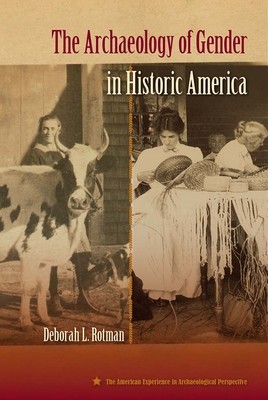
- We will send in 10–14 business days.
- Author: Deborah L Rotman
- Publisher: University Press of Florida
- ISBN-10: 0813064775
- ISBN-13: 9780813064772
- Format: 15.2 x 22.9 x 1.2 cm, softcover
- Language: English
- SAVE -10% with code: EXTRA
Reviews
Description
"Essential reading in gender studies, The Archaeology of Gender in Historic America shows how historical archaeology has nuanced historiography-based understandings of American gender relations."--Stacey Lynn Camp, author of The Archaeology of Citizenship
"A powerful synthesis of gender-focused archaeological research. Rotman deftly shows that the study of place and material culture can reveal diverse experiences of gender in historic North America."--Barbara L. Voss, author of The Archaeology of EthnogenesisPatriarchy, colonialism, and the capitalist mode of production have shaped gender through time and across many different cultures. In historic America, gendered social relations were created, codified, and reproduced through the objects used in cultural rituals, the spatial organization of houses, the construction of village landscapes, and the institutions of society, in addition to other social, ideological, economic, and political forces. From domestic spaces to the public realm, Deborah Rotman contextualizes gender and the associated social relationships from the colonial period through the twentieth century. By exploring how individuals and families negotiated and mediated these relationships, she sheds light on how prescriptive gender categories affected those expected to follow them and examines how diverse groups responded to popular gender ideologies. Additionally, she reveals the ways gender and society influence each other, exposing how American normative notions of masculinity and femininity intersect with class, ethnicity, race, sexuality, and identity. Albeit, Rotman contends, they do not intersect in mutually supportive ways, ultimately giving rise to transformative social changes.
EXTRA 10 % discount with code: EXTRA
The promotion ends in 16d.21:07:33
The discount code is valid when purchasing from 10 €. Discounts do not stack.
- Author: Deborah L Rotman
- Publisher: University Press of Florida
- ISBN-10: 0813064775
- ISBN-13: 9780813064772
- Format: 15.2 x 22.9 x 1.2 cm, softcover
- Language: English English
"Essential reading in gender studies, The Archaeology of Gender in Historic America shows how historical archaeology has nuanced historiography-based understandings of American gender relations."--Stacey Lynn Camp, author of The Archaeology of Citizenship
"A powerful synthesis of gender-focused archaeological research. Rotman deftly shows that the study of place and material culture can reveal diverse experiences of gender in historic North America."--Barbara L. Voss, author of The Archaeology of EthnogenesisPatriarchy, colonialism, and the capitalist mode of production have shaped gender through time and across many different cultures. In historic America, gendered social relations were created, codified, and reproduced through the objects used in cultural rituals, the spatial organization of houses, the construction of village landscapes, and the institutions of society, in addition to other social, ideological, economic, and political forces. From domestic spaces to the public realm, Deborah Rotman contextualizes gender and the associated social relationships from the colonial period through the twentieth century. By exploring how individuals and families negotiated and mediated these relationships, she sheds light on how prescriptive gender categories affected those expected to follow them and examines how diverse groups responded to popular gender ideologies. Additionally, she reveals the ways gender and society influence each other, exposing how American normative notions of masculinity and femininity intersect with class, ethnicity, race, sexuality, and identity. Albeit, Rotman contends, they do not intersect in mutually supportive ways, ultimately giving rise to transformative social changes.


Reviews